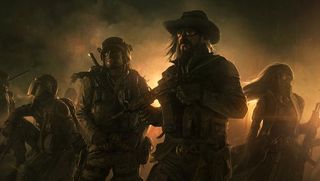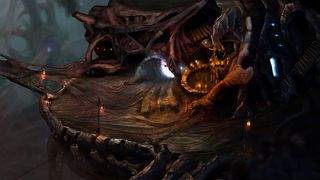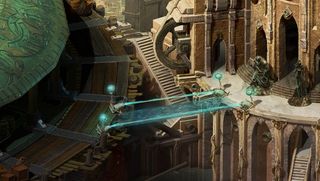So, what can we expect from inXile's current duo of games? Torment has been billed as a spiritual follow-up to Planescape, although Fargo is keen to stress that it isn't a sequel. Try to think of the way the recent crop of BioShock games relate to System Shock. "I think the original Planescape was very different to a lot of games, and it ended in a very neat way," says Fargo. "We’ve had a lot of people say to us that they just don’t want a sequel to that game anyway. We’re technically nothing to do with Planescape – we don’t own the brand, we’re not using any copyrighted material, we have nothing to do with it. What we are trying to do is capture the spirit and vibe of Planescape, and make a very philosophical role-playing game. It has a much more literary vibe than most RPGs, it’s a game for people who love to read. And that’s different to Wasteland 2, which is for people who love to blow things up more. In fairness, there’s a lot of writing depth to Wasteland, so I don’t want to simplify it in that way.

Despite being very different games, Torment and Wasteland 2 share several unifying themes, the most significant of which is choice. "Player choice--or as we sometimes call it ‘reactivity’ - is everything," explains Fargo. "It’s what makes our narrative so different because, if you want a simple, linear story-telling device then you’d just read a book. It’s your ability to change the story, to say “I wonder what would happen if I did that;” which makes our games so intriguing and exciting. We want players to be excited about going back and replaying our games, thinking “Wow, I wonder what would have happened if I’d done this thing instead of that”. For all games that offer choice, I’ve always found that the journey - what you do along the way - is really the greatest reward.
The original Wasteland, which released back in 1988, is the game that eventually inspired the Fallout series. So it seems fitting that Chris Avelone, from Obsidian - creators of Fallout New Vegas - has been working with inXile on Wasteland 2. "He’s great to have as someone to run ideas by, and he’s even made some specific levels which we can hold up to other designers and say: “this is the kind of quality and vibe we’re expecting from the rest of the game”. So, that’s how he’s worked with us," says Fargo. "He has been living in the trenches of post-nuclear RPGs longer than anyone, so it’s great to get his input".
Fargo has been working in the games industry since 1982, and has worked with some of the biggest names and studios in the business. So he seemed a little stumped when we asked if there was anyone else he'd like to collaborate with. "That’s a great question. I would probably like to work with Sid Meier (who created Civilization and Pirates), because he’s so down in the trenches with games. He’s so good with the science of things, so I think I would learn a lot from him. I’d definitely put him right up there on my list". Excellent choice, especially as Civilization appears on our list of the 50 Most Important Games Ever.

In the 30 years since Fargo started making games, the industry has grown from bedroom enterprise to multi-billion dollar business. Recently, Square Enix announced their yearly financial results, and despite Hitman selling 3.5 million units and Tomb Raider shifting 4.5 million, the publisher described these sales as 'disappointing'. "I think that when those kind of numbers are considered a failure – because you’re doing in excess of $100 million at retail – you have to start looking at the way you’re doing things. I think that this business spends way too much time looking at GTA 5 and World of Warcraft; numbers, but I’ve always found that to be a waste of time. That would be a complete waste of time. And it wasn’t just 3 million units total, either, it was 3 million units in the first few weeks, so it isn’t as if those games have finished selling".
He continues: "To me, it’s like I’m starting a band and I say to my friends: “Let’s look at the Rolling Stones’ numbers”. So I don’t see how that can be considered a failure unless they’re using it to get some kind of extra PR or marketing. I know the products are solid – everybody loves the games. So you have to wonder: if you’ve made a great quality game that everybody loves, and you’ve done 2-3 million units in a few weeks, then unless that’s a success, then you really need to look at how you’re doing things".
One company that is taking a good, hard look at the way it makes games is EA. The SimCity and Mass Effect publisher has been in the news recently for being voted The Worst Company in America, according to the readers of Consumerist. "I think we all know that there are worse companies than EA - companies that are doing things to harm people and the environment etc – and I really don’t think EA deserve that title," he says. "I think it’s unfortunate, and I think it all started around that Mass Effect 3 ending last year. Everyone is pretty riled up against EA at the moment, and I think that the SimCity debacle fell on top of it at the wrong time. It seems like EA have some really bad things that happen to them just when the voting for the worst company is going on".

Fargo's relationship with EA goes back to 1985, when he made the original Bard's Tale for the then fledgling publisher. 28 years on, he's still making innovative games for the PC market; but does he have any plans to bring his latest games to current or next-generation consoles? After all, Torment won't release until 2015. "It’s certainly possible and technically feasible," he says. "However, we’ve gone to the crowd and they’ve given us money for a very specific purpose, which is to put our games on the PC, Mac and Linux. So that’s where we’re expending 100% of our efforts. We don’t spend any of our time wondering whether it can or can’t be done on consoles, because that isn’t our charter. Our charter is to deliver these first versions".
Expect the first of inXile's Kickstarter titles, Wasteland 2, later this year.

